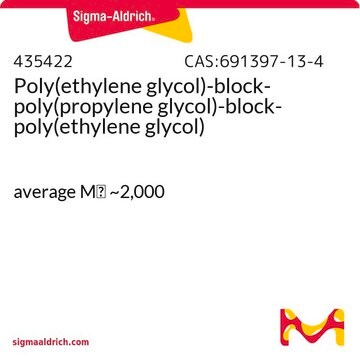P2443
Pluronic® F-127
powder, BioReagent, suitable for cell culture
Synonym(s):
Non-ionic copolymer surfactant
About This Item
Recommended Products
description
Non-ionic
contains 100ppm BHT
product line
BioReagent
form
powder
mol wt
~12600 g/mol
technique(s)
cell culture | mammalian: suitable
CMC
950-1000 ppm (~25°C)
transition temp
cloud point >100 °C
HLB
18 - 23
InChI
1S/C3H6O.C2H4O/c1-3-2-4-3;1-2-3-1/h3H,2H2,1H3;1-2H2
InChI key
RVGRUAULSDPKGF-UHFFFAOYSA-N
Related Categories
General description
Application
- as a delivery system for a peptide to the wound site to study the effect of the peptide on wound healing in mice.
- as a surface coating for PDMS (polydimethylsiloxane) stamps to make them hydrogel repellent.
- in the preparation of calcium indicator stock solution for measuring neural activities.
- as a component of phosphate-buffered saline (PBS), to lower unspecific cell and protein adhesion to a PDMS-based microfluidic device.
- This non-ionic copolymer surfactant is suitable for use in insect cell culture applications as an antifoaming agent.
Biochem/physiol Actions
Legal Information
Storage Class Code
11 - Combustible Solids
WGK
WGK 1
Flash Point(F)
Not applicable
Flash Point(C)
Not applicable
Personal Protective Equipment
Certificates of Analysis (COA)
Search for Certificates of Analysis (COA) by entering the products Lot/Batch Number. Lot and Batch Numbers can be found on a product’s label following the words ‘Lot’ or ‘Batch’.
Already Own This Product?
Find documentation for the products that you have recently purchased in the Document Library.
Customers Also Viewed
Articles
Local delivery of bioactive molecules using an implantable device can decrease the amount of drug dose required as well as non-target site toxicities compared to oral or systemic drug administration.
Related Content
Tissue engineering fabricates tissues cultures from scaffolds, living cells, and biologically active molecules by simulating the microenvironment of the body to repair or replace damaged tissue.
Tissue engineering fabricates tissues cultures from scaffolds, living cells, and biologically active molecules by simulating the microenvironment of the body to repair or replace damaged tissue.
Tissue engineering fabricates tissues cultures from scaffolds, living cells, and biologically active molecules by simulating the microenvironment of the body to repair or replace damaged tissue.
Tissue engineering fabricates tissues cultures from scaffolds, living cells, and biologically active molecules by simulating the microenvironment of the body to repair or replace damaged tissue.
Our team of scientists has experience in all areas of research including Life Science, Material Science, Chemical Synthesis, Chromatography, Analytical and many others.
Contact Technical Service



